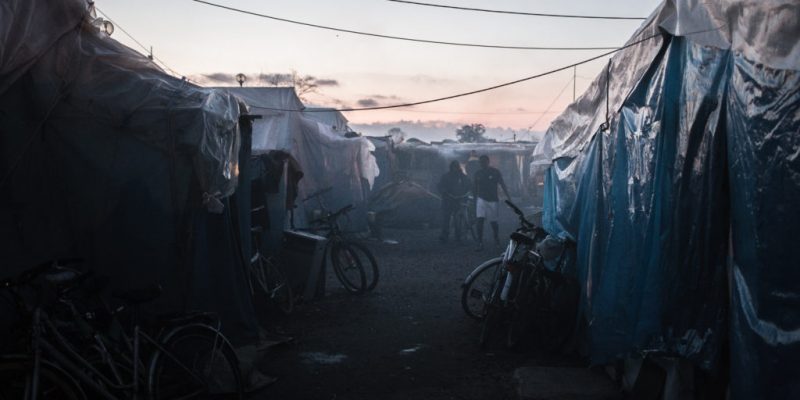1. Another death in the San Ferdinando migrant camp
An 18-year-old Gambian migrant, Suruwa Jaithe, was killed in a fire that broke out Saturday night at the San Ferdinando migrant tent camp.
He had arrived from Gambia alone while still a minor, and he had been processed in the SPRAR system at Gioiosa Ionica, in Calabria, about 50 kilometres from the San Ferdinando camp, where hundreds of migrant field workers are living in extreme conditions.
Less than a third of the African workers in the Gioia Tauro Plain has a job contract. All of them are living in limbo, facing uncertain asylum decisions, no long-term housing, exploited by their employers. We visited the camps on the Plain with Daniela Sala to speak with workers and union representatives, to learn more about the fight against the new slavery.
2. 40,000 migrants forced out of Italian reception centres under the new Salvini Bill
Italy is about to witness the effects of the Salvini bill. From the migrant centres of Mineo and Isola capo Rizzuto, the first dismissals of migrants have begun.
Those who are living in first reception centres as beneficiaries of international protection, including women and children, will have to leave. The order has been issued from the Prefectures. 40,000 people are at risk, while 15,000 aid workers will lose their jobs.
According to Oliviero Forti, who is in charge of migrant policies and international protection for Italian Caritas, “People are leaving the centres with no prospects. There is a risk of them becoming highly irregular.”
According to researcher Matteo Villa, 130,000 foreigners are at risk of becoming irregular.
3. On board the Nuestra Madre Loreto
On November 22nd, the Spanish fishing boat Nuestra Madre Loreto rescued a group of people who had been abandoned in the waters by the Libyan Coast Guard. The situation on board is critical: the boat is running out of fuel and the migrants are debilitated. The Spanish government, however, is still set on leaving the fate of the migrants in the hands of Libya.
4. Italy withdraws from the Global Compact on migration
“Italy is not going to Marrakech and is not signing anything”, the Italian Interior Minister said while announcing that the country had withdrawn from the Global Compact on migration.
The pact has several goals, including minimising the vulnerability of migrants, fighting human trafficking and boosting cooperation between states for a better management of migration.
The Compact is a text full of ideas and innovation, as well as a significant political achievement in a time dominated by nationalism and xenophobia, as Marta Foresti described it while explaining the importance of the pact.
5. Calais from the Jungle to perilous crossings
Increasing police raids in Calais are leading to a rise in illegal Channel crossings. The Guardian has reported that in the past month alone, 110 people have crossed the English Channel into British waters in small boats not fit for travel.
We had visited Calais in February last year, to document the lives of migrants after the evacuation of the Jungle.
Meanwhile, West Yorkshire police are investigating a report of a racially aggravated assault against a 15-year-old Syrian refugee by his schoolmates. The attack had been filmed and shared on social networks.
6. Being Black in the EU
A new survey from the Fundamental Rights Agency shows that people of African descent in the EU face widespread and entrenched prejudice and exclusion.
Hurdles to inclusion are multi-faceted, with many respondents facing discrimination during their job search and when looking for housing. The survey examines the experiences of almost 6,000 people of African descent in 12 EU Member States.
7. Tyson, the Italian champion fighting against racism
In 2018 alone Tyson Alaoma, a boxer with Roma Boxe Torre Angela who was born in Italy to Nigerian parents won a bronze medal on the European championship, competed in the world championship and finally won the Italian Youth championship. In addition to his opponents’ blows, Tyson has had to fight racism and bureaucracy. “There are two countries, the one where you were born that calls you a n****r and the one that celebrates you even if it doesn’t know you”, said the young athlete, who was prevented from participating in several international competitions last year due to citizenship issues.
8. Regular migrants to bear the brunt of new tax
The Italian government plans on introducing a new 1.5% tax on money transfers to foreign countries from migrant workers, raking in 60 million euros. A study by Fondazione Leone Moressa has analysed the consequences of the proposed money transfer tax. The tax would run go against Italy’s international obligation, and would especially affect communities from Bangladesh, Senegal and Sri Lanka (the ones with most transfers to their countries of origin).
Last year, migrants paid 335 million euros in commissions alone, as well as contributing almost 12 billion to the Italian pension system.
9. Migrant woman in Italy attacked for “bringing disease”
She disembarked at Pozzallo on Saturday night, a victim of rape and violence who had given birth alone in Libya. Upon arrival in Italy, Fara suffered a new humiliation when she
The myth of the foreigner as a bringer of disease is a recurring one, often perpetuated by anti-migrant narratives and used to justify anti-migrant policies, forgetting how travels at sea are still the leading cause of death among migrants, much more than disease. Furthermore, a recent study has shown that often it’s foreigners catching diseases from Italians.
10. Human rights groups and migrants under attack from Croatian police
They have been abused, beaten and robbed by Croatian police officers. Several violations of human rights have been reported by the migrants attempting to cross the Bosnian border. The Balkan route is still being used by hundreds of migrants, amid escalating deterrence policies from Balkan countries.
Foto di copertina: San Ferdinando, 2017 (foto: Diego Fedele)









